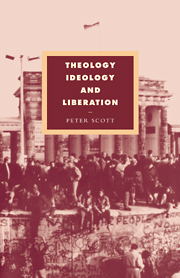Introduction
Published online by Cambridge University Press: 05 December 2011
Summary
This book is about the liberation of theology from ideology. It seeks to discern whether theology is the critic of the eclipse of God or an unwitting contributor to that very eclipse. My main concern is with the question: how might theology be nonideological? This is no academic matter. Ideological strategies are those which effectively obscure, mis-speak or misrecognise the social history of which they are a part. If we cannot be sure that theology may speak non-ideologically, then we cannot be sure that theology is the critic, rather than the apologist, of society.
But who comprises this ‘society’? ‘We’ are those who inhabit the dominant ‘centre’ of this global society, and whose activities, as Enrique Dussel (1985) suggests, shape the activities of those on the periphery (whether intentionally or not). My question then is asked from the centre, and is directed to the centre. But what theological word should be spoken from the centre?
The urgency of this matter lies in the problems currently facing Western society and that Christianity claims to speak a message of hope. On the one hand, this society is undergoing its own profound difficulties regarding its relations with external nature, its relations with the periphery, and the attempt to secure over again its global economic dominance.
- Type
- Chapter
- Information
- Theology, Ideology and Liberation , pp. 1 - 6Publisher: Cambridge University PressPrint publication year: 1994



